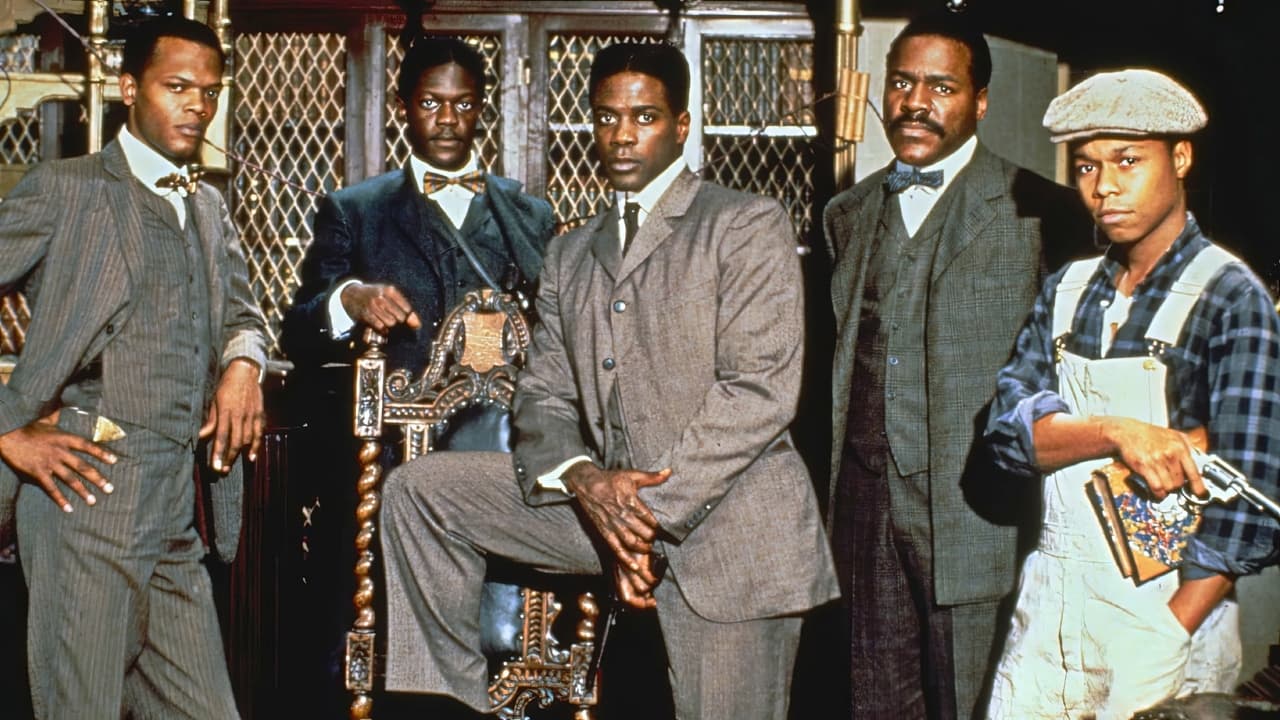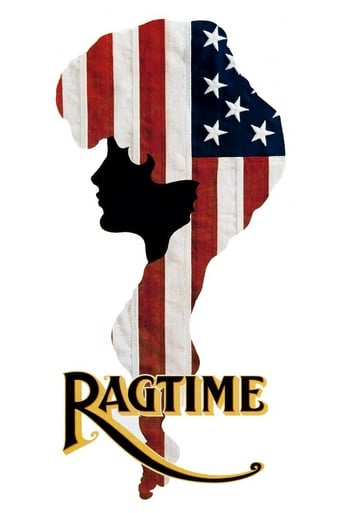

Millionaire Harry Kendall Thaw (Robert Joy) is enraged when architect Stanford White put a naked statue, modeled from his chorus girl wife Evelyn Nesbit (Elizabeth McGovern), on top of Madison Square Garden. He shoots White in a packed nightclub. He offers a $1 million divorce if Evelyn testifies for him. He is found not guilty by reason of insanity. She had been having an affair with Younger Brother (Brad Dourif) and Harry threatens to sue her for a small settlement. Younger Brother's family lives in comfortable upper class. Sarah (Debbie Allen) abandons her baby in their yard. Mother (Mary Steenburgen) takes them both in. Brash ragtime pianist Coalhouse Walker Jr. claims to be the father. He gets into an ongoing battle with the firemen and cops. Tateh (Mandy Patinkin) leaves his cheating wife and the tenements in New York. He takes his daughter and becomes a director.This is just too epic. Director Milo Forman expertly films it. It is beautiful looking and jam packed with story. It is packed with too many characters and too many stories. There are maybe two or three full movies and this connects them with thin little threads. The flow is disrupted again and again. Some of characters are not compelling enough and their stories drag. It may be better to divide this epic into solid stand-alone sections.
... View MoreE.L. Doctorow's sprawling novel set in New York of 1910 was adapted rather loosely by Milos Forman to tell a story of race and justice in America. The main plot lines, that of a black man (Howard E. Rollins Jr.) seeking justice for the vandalism done to his car, and the sensational trial of Harry K. Thaw for the murder of famed architect Stanford White seem unrelated at first. As the picture winds on, however, the point of the parallel stories becomes more obvious: in the white rich man's world of the day, Thaw's money and family connections could manipulate the justice system to give him the results he desired, even free him from responsibility for his crime, while Rollins' character could have no such expectations, however justified his outrage. A further subplot involving the rise of immigrant artist Mandy Patinkin is woven into he fabric of the narrative, giving the film at least some of the sprawling flavor of the book, although other plot lines had to be cut for brevity's sake. Forman had many of his usual collaborators, such as art director Patrizia Von Brandenstein (Amadeus) and choreographer Twyla Tharp (Hair), assisting him in the elaborate task of minutely re-creating period details of interior decoration, dance, and stage entertainment that give the film its wonderful period color. A superb ensemble cast which also included James Cagney, Mary Steenbergen, James Olsen and Brad Dourif works hard to portray the manners and mores of the day, not to mention the racial and class attitudes, which made up so much of the fabric of the novel. All in all, it is a very good and watchable film on its own, although fans of the book might balk at some of the changes made in its adaptation. Features a then-controversial nude scene involving Elizabeth McGovern, in a terrific debut performance as Thaw's wife, showgirl Evelyn Nesbitt.
... View MoreI read the book years ago, and am glad I finally got around to watching the movie. It is an engrossing and well crafted story, beautifully set in the final years of the American Gilded Age. On the surface it appears to be a wonderfully happy and enthusiastic era, but the tensions created by the different racial groups and social classes of that time show that, aside from the wonderful architecture, manners and wardrobe of the well-to-do, most people of that period suffered the same challenges and woes as they always have. Same crap, better packaging.I was originally unhappy that they didn't do more with the character of Evelyn Nesbit, played by the captivating Elizabeth McGovern, but I finally understood that her character wouldn't let herself get involved with the many nasty situations that happened. She just floated away to the next soirée when things got ugly. All the other characters got sucked into the many interrelated subplots because they cared, and wanted to deal with the challenges and problems - not simply move on to greener pastures.Some of the less enthusiastic comments here indicate some viewers didn't care for the film because it didn't contain all the characters and sub-stories that were in the book, but to me that is irrelevant. The movie stands well on its own merits. It is a powerful and thoroughly enjoyable film, with a great ending. As Evelyn elegantly waltzes around in dreamy bliss with yet another beau, we see that all the efforts of most of the other key characters to solve their problems and find happiness have turned to doo doo. It ends with a shot of a newspaper headline announcing the start of World War I. The Gilded Age is over.
... View MoreE.L Doctorow's novel "Ragtime" is an amazing achievement, blending real life an fictional characters into a thrilling and heartbreaking story. However, since there are many different story lines in the novel, making a film would be difficult. E.L Doctorow hoped that "Ragtime" would be made into a t.v miniseries which is really the only way i could ever see it working, even though the musical version in 1998 did an impressive job of adapting the novel.Unfortunately, Milos Foreman's film version did not. While it would be difficult ton include every aspect of the novel into a film, many major parts of the novel were not included, for instance, Father (a fine performance from James Olson) does not go on his expedition with Admiral Perry, so therefore father doesn't return a changed man, and Mother (a miscast Mary Steenburgen in an unimpressive performance) cannot discover her independence, and her character is greatly diminished. Likewise, the story of the immigrant Tateh (a fine performance from Mandy Patinkin) is too briefly seen, even though they do include the episode of him kicking out his unfaithful wife (played by an unknown Fran Drescher), which was eliminated from the Musical. On the opposite side, they pay an unusually large amount of attention to Evelyn Nesbit's story, which is only a minor thread to the overall plot. However, one can't complain about this too much, as Elizabeth McGovern gives a dazzling performance as Evelyn Nesbitt.Not surprisingly, the most attention is spent on Coalhouse Walker's story, as it is the most compelling and dominant. However, changes make this story somewhat less compelling, such as him not bringing Sarah back to him through his music. not to mention underpowered performances from Howard Rollins as Coalhouse and Debbie Allen as Sarah.It must be noted, that i can't really imagine a successful way to film the novel, i could really only imagine it working as a miniseries, which hopefully one day, it might.
... View More